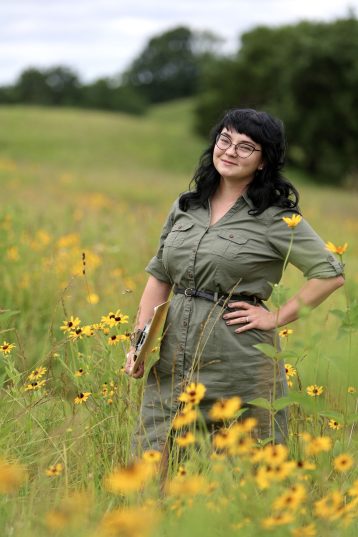Whether you live in the city or country, you are fortunate to have access to plenty of nature right outside your front door. The Mississippi River, open fields, parks, flowing creeks and clusters of woods are all part of our daily landscape living in the tri-state area.
Having close access to the natural world is a large part of why many parents choose to live and raise their children here, rather than in a larger surrounding metropolitan area.
The health benefits of spending time outdoors have long been praised in our society. Most often, we hear about the physical health benefits we reap from being outside (increased cardiovascular health and decreased obesity being the big ones).
However, more research is being done about the benefits nature has on our mental health and the damage that is inflicted when time spent outdoors no longer becomes a part of our daily routines.
Kids today spend an inordinate amount of time attached to technological devices. No matter how one feels about it, the reality is that many modern educational assignments, social interactions and leisure activities rely in large part on technology.
Our children have grown up with devices that provide instant information and social connection in their hands, and those of us who didn’t grow up this way have adapted easily enough.
The simple truth is that technology is what drives our society, and fighting this is futile.
So, while we’ve expanded our lives to make room for necessary technology, we also need to adapt our schedules to make sure that time spent outside is incorporated into our children’s lives in some way.
Despite all the advantages technology brings, there are some things that only nature can provide.
Here are a few:
Incorporating the 5 senses
A truly stimulating experience in life is one that incorporates our use of all five senses: Touch, taste, sound, smell and sight. When we are immersed in an experience that activates all our senses, our brain synapses light up, and we often feel intellectually and emotionally satisfied in ways other experiences cannot match.
Teachers have long known that the more a child uses his or her senses during an educational experience, the more meaningful (and long-term) the learning is that takes place. In fact, studies have shown that more impactful learning takes place for students who work in outdoor or green spaces compared to students who receive their lessons inside.
There are few, if any, technological experiences that simultaneously awaken all our senses in the way that nature can. Even virtual reality is only superficially stimulating us. When a child goes outside, his or her mind and heart awaken in ways that often remain closed inside the confinement of four walls.
Inspiring a sense of wonder and inquiry
Children today are growing up in the age of Google, or what some are calling the “Know-It-All Age.” We can ask an A.I. device a question and promptly receive an answer. While this is undoubtedly helpful in many ways, it doesn’t do very much for motivating a sense of inquiry and discovery.
Critical thinking is developed and deep, meaningful learning occurs through open-ended questions that require thoughtful research and exploration to answer. When children go outside, they naturally begin observing, questioning and hypothesizing about what they see.
This is open-ended inquiry, and it not only engages a child’s brain at a high level, it teaches them that they can seek knowledge and answers for themselves. They don’t have to rely on an electronic device to have all, or even the correct, answers to the questions that arise in their lives.
Reduces depression and anxiety
There’s much discussion amongst parents, doctors and educators about the rise of depression and anxiety in our youth today. This isn’t hypothetical either, as there has been a steep increase in the amount of anti-depressants prescribed to children in recent decades. This rise in depression has even been attributed to our increased dependence on technology, as a correlation has been found between the amount of time spent online and feelings of isolation and depression.
Multiple studies have been conducted on the positive effect nature has on combating depression, many of which Richard Louv discusses in his book, “Last Child in the Woods.” In this work, Louv concludes, “Although exposure to nature may have no impact on the most severe depressions, we do know that nature experiences can relieve some of the everyday pressures that may lead to childhood depression.”
While there is plenty of evidence to support nature as an effective remedy for childhood depression, there are only theories as to why this is so. Some of these theories involve the healthy social interactions that often take place outdoors, as well as the calming effects the sights and sounds of nature have on our physical and mental selves.
Others, such as Louv, suggest that nature gives children a safe space to explore and understand meaning in the world; an understanding without which, “we forget our place; we forget that fabric on which our lives depend.”
Reduced stress and increased attention
Along with increased depression and anxiety, we are seeing a rise in both academic burnout and ADHD diagnoses in children today. Interestingly enough, as our society has become more reliant on technology, people — children included — are expected to sit with focused attention for longer and longer periods of time. This is a far cry from not too long ago when our society was more agricultural, and high energy levels were valued — particularly in our youth.
Time spent with nature has been proven to improve mental concentration and help mitigate the effects of ADHD. This is because when we are immersed in nature, our attention usually is held through “soft fascination,” which is a sense of general awareness based on natural interest. This is in contrast to “direct attention,” when we have to force ourselves to pay attention to a specific subject and ignore any outside distractions.
Throughout much of the day, children are forced to listen and learn through direct attention, which mentally is exhausting. When children are given time to explore through soft fascination in nature, their minds have a chance to rejuvenate and refresh.
Studies show that time spent in nature immediately is followed by increased focus and improved mental performance, no matter the task at hand. This might be why parents of children with ADHD observe that their children are calmer after time spent playing in nature, even more so than after time engaged in sports.
Children need to spend time outdoors for healthy physical and mental development. This could be time spent hiking, gardening, fishing or simply roaming a grassy field. Children are most fascinated with the nature closest to their homes. For those of us living in the Midwest, the question is not really where we will find nature but where we will find the time for our children to explore it.
We often think of time in nature as “down time” or even as a way to “kill time.” Louv encourages us to change this way of thinking and to begin regarding time in nature as essential to the healthy growth and development of our children — much as we think of their time in school.
He concludes his research with the following words of advice: “By taking nature out of the leisure column and placing it in the health column, we are more likely to take our children on that hike.”
Melissa Hyde has a masters in education from Pepperdine University in Los Angeles and more than 10 years experience teaching elementary education. She works for Challenge to Change in Dubuque, teaching children social emotional regulation skills through the practices of yoga and mindfulness.



















